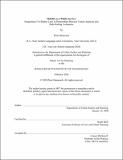| dc.contributor.advisor | Justin Steil. | en_US |
| dc.contributor.author | Damrosch, Peter(Peter Leopold) | en_US |
| dc.contributor.other | Massachusetts Institute of Technology. Department of Urban Studies and Planning. | en_US |
| dc.date.accessioned | 2021-02-19T20:31:40Z | |
| dc.date.available | 2021-02-19T20:31:40Z | |
| dc.date.copyright | 2020 | en_US |
| dc.date.issued | 2020 | en_US |
| dc.identifier.uri | https://hdl.handle.net/1721.1/129872 | |
| dc.description | Thesis: M.C.P., Massachusetts Institute of Technology, Department of Urban Studies and Planning, February, 2020 | en_US |
| dc.description | Cataloged from student-submitted PDF of thesis. | en_US |
| dc.description | Includes bibliographical references. | en_US |
| dc.description.abstract | Recently, a number of public transportation agencies have formed partnerships with Transportation Network Companies (TNCs) such as Uber and Lyft. Proponents of these collaborations emphasize their potential to expand the reach of public transportation systems, while skeptics caution that transit agencies should not divert resources from core bus and rail networks, and should not rely upon drivers who lack basic health and employment benefits. This thesis contributes to the growing body of research around TNC partnerships by focusing on one important dimension: the degree to which these partnerships meet the standards of federal civil rights law. Laws such as Title VI of the Civil Rights Act of 1964 require transit agencies to ensure that the benefits and burdens of their services are distributed equally. And yet despite the importance of these laws, little is known about how transit agencies are meeting their civil rights obligations in the context of partnerships with TNCs. | en_US |
| dc.description.abstract | To shed light on this question, I reviewed the existing research on TNC partnerships and conducted eighteen interviews with officials from transit agencies, advocacy organizations, and the Federal Transit Administration. I have found that the level of attention and regulatory innovation has varied across civil rights regimes. Many transit agencies have devoted substantial attention to the Americans with Disabilities Act, finding new ways to use these partnerships to improve mobility for people with disabilities. And yet, four years into this series of partnerships, there has been much less innovation with regard to Title VI and the Executive Order on Environmental Justice, which together prohibit discrimination on the basis of race and income. With a few limited exceptions, transit agencies have generally not taken the steps needed to ensure that TNC partnerships comply with these bedrock civil rights provisions. | en_US |
| dc.description.abstract | This is an area where advocates, regulators, and transit agencies should devote greater attention. If these partnerships are to play a role in the future of public transportation--as some advocates believe they should--they must satisfy the basic legal and ethical imperative of providing service transparently and equitably. | en_US |
| dc.description.statementofresponsibility | by Peter Damrosch. | en_US |
| dc.format.extent | 90 pages | en_US |
| dc.language.iso | eng | en_US |
| dc.publisher | Massachusetts Institute of Technology | en_US |
| dc.rights | MIT theses may be protected by copyright. Please reuse MIT thesis content according to the MIT Libraries Permissions Policy, which is available through the URL provided. | en_US |
| dc.rights.uri | http://dspace.mit.edu/handle/1721.1/7582 | en_US |
| dc.subject | Urban Studies and Planning. | en_US |
| dc.title | Mobility as a public service : integrating civil rights laws in partnerships between transit agencies and ride-hailing companies | en_US |
| dc.title.alternative | Integrating civil rights laws in partnerships between transit agencies and ride-hailing companies | en_US |
| dc.type | Thesis | en_US |
| dc.description.degree | M.C.P. | en_US |
| dc.contributor.department | Massachusetts Institute of Technology. Department of Urban Studies and Planning | en_US |
| dc.identifier.oclc | 1237267771 | en_US |
| dc.description.collection | M.C.P. Massachusetts Institute of Technology, Department of Urban Studies and Planning | en_US |
| dspace.imported | 2021-02-19T20:31:10Z | en_US |
| mit.thesis.degree | Master | en_US |
| mit.thesis.department | UrbStud | en_US |
